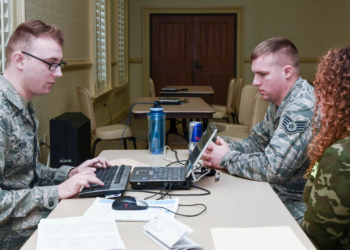Life insurance may be a contender for the topic couples least like to talk about. But planning ahead for that worst-case scenario is an important way to build a secure financial future for your family.
So, when is the right time to have the life insurance conversation with your spouse?
“Almost any time is the right time,” “says Education Presenter and Military Liaison Heather Walrath of Navy Mutual’s Education and Veterans Services team.”
The COVID-19 pandemic has served as a life insurance wake-up call for many people, but Walrath maintains the subject should be on every military family’s to-do list.
“I’m a fan of however you get there, it’s good that you got there to have that discussion,” said Walrath, an accredited financial counselor and military spouse for the past 25 years.
To create distraction-free discussion time, schedule a “money date,” which could include a meal out and a broader conversation about future financial goals.
“Life insurance in general is about continuing all those goals. It doesn’t have to be such a heavy topic if you can connect it to fun topics like homebuying, your savings, trip planning and those types of things,” said Walrath, adding she would avoid in-depth financial discussions during emotionally stressful times such as prior to a deployment or after a loved one’s death.
However, making sure that you have adequate life insurance in place prior to being called on a deployment is key for any military family—just have the conversation prior to the stress of preparing for a deployment and it will make for an easier and more productive conversation.”
Active-duty military as well as some reserve and National Guard members are eligible for $400,000 in Servicemembers’ Group Life Insurance (SGLI) for a $24 monthly premium, while Family Servicemembers’ Group Life Insurance (FSGLI) can provide a spouse with up to $100,000 of coverage and dependent children with $10,000 each.
Whether that coverage is adequate depends on many factors, including your monthly living expenses, number and age of children, existing debt and savings or other assets. The U.S. Department of Veterans Affairs’ “Insurance Needs Calculator” https://insurance.va.gov/NeedsCalculator can serve as a guide, but ultimately every family’s needs may be different.
“Are you getting this policy to pay off the mortgage or to pay the kids’ way through college?” Walrath asked. “Have a conversation about if you’re going to have this money, how is it going to be used?”
Whole and term insurance are the two principal types of life insurance. Term insurance is generally less expensive than whole life because it provides coverage for a specific term — typically 10 to 30 years — and can offer level premiums. In contrast, whole life is considered “permanent” insurance and accrues cash value over your lifetime, but comes with a higher cost because of a death benefit is guaranteed.
Because there are many choices when buying life insurance, Walrath recommends getting multiple online quotes before reaching out directly to companies for tailored advice.
“At a minimum, get three different quotes. I would hope Navy Mutual would be one of them. We’re different because we’re a nonprofit organization and we’re a Veterans Service Organization,” she said. “That focus on people before profits is important.”
Most service members will not have difficulty purchasing commercial life insurance, though paratroopers or others with high-risk jobs might see higher premiums.
“If you have a job that is considered riskier by the actuary, that absolutely could come into play,” she said. “It’s also important when you are looking at a policy to make sure they don’t have any military exclusions. Look for military-friendly companies when getting your quotes.”
Even if a spouse is not employed full time, their contributions to childcare, housework and family logistics have a monetary value, making a spouse’s policy an important part of a family’s overall financial plan.
Guaranteeing future insurability is another reason for couples to consider buying insurance while young and healthy. Walrath offers her own personal story as an example. She was diagnosed with an autoimmune disease one year after buying term insurance.
“There’s value in getting these policies early,” she said. “I locked it in for 30 years, and I still have it today.”
Upon separation or retirement, service members can convert SGLI to a five-year renewable Veterans’ Group Life Insurance (VGLI) or commercial whole life policy. This provides guaranteed insurability but may be more expensive for healthy individuals than other policies.
Because insurance needs change over time, Walrath suggests couples make a “life insurance check-in” an annual money date topic. They can review policy beneficiaries, confirm their spouse’s final wishes and revisit how insurance proceeds would be used.
While costs are a major consideration when purchasing life insurance, Walrath says families should examine a policy’s internal fees and make note of the insurer’s financial strength (available from Fitch Ratings and AM Best rating service).
Most importantly, she says, “You want to buy life insurance, not have it sold to you. You don’t want to feel pressured.”
To get a fair quote that puts your military family’s needs first, visit Navy Mutual at navymutual.org.
Navy Mutual Aid Association’s Education Team educates servicemembers and their families on matters of financial security and advises them on other federal benefits at no charge. As the Navy’s preferred referral source for Survivor Benefits, Navy Mutual continues to be a trusted source for our nation’s military.
Read comments






































